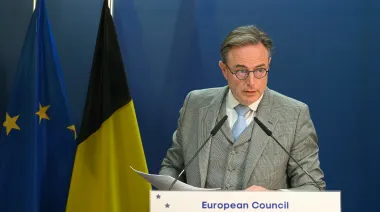Belgium blocks €140 billion "reparations loan" to Ukraine funded by Russian assets

Belgium has blocked the provision of a "reparations loan" to Ukraine worth €140 billion, which was intended to be financed through profits generated from frozen Russian assets. EU leaders have postponed the discussion until December, dashing the Ukrainian government's hopes of receiving the funds at the beginning of 2026.
Source: Financial Times
Quote: "Leaders of 26 EU countries – Hungary abstained – asked the European Commission to 'present, as soon as possible, options for financial support based on an assessment of Ukraine's financing needs' but did not formally back a loan based on Russia's immobilised assets."
Details: At the Brussels summit, the proposal to use profits from frozen Russian assets – around €190 billion – to finance a large-scale loan for Ukraine met resistance from Belgium. Since most of these assets are held at the Euroclear central securities depository in Brussels, Belgium fears becoming the main target of legal claims and financial countermeasures from Russia.
"We took the most important political decision to ensure full financial support for Ukraine to address their financial needs in 2026 and 2027," said European Council President António Costa, while noting that there are still "technical issues" that need to be resolved.
Belgian Prime Minister Bart De Wever stated that his country needs absolute clarity on the legal basis for such a step and the potential risks to the euro, as well as guarantees from other countries that the money could be repaid if necessary.
"A legal basis is not a luxury," he emphasised.
French President Emmanuel Macron noted that the loan "remains the central set of options" for supporting Ukraine despite the temporary setback.
German Chancellor Friedrich Merz, while supporting the loan, acknowledged that Belgium had raised "some very serious questions" that must be addressed.
The lack of a decision jeopardises plans to finance Ukraine's defence and budgetary needs. President Volodymyr Zelenskyy, who attended the summit, stressed the critical importance of receiving the funds at the beginning of 2026.
"We need the money in 2026 and better to have it in the very beginning of the year, but I don't know if it's possible," he said.
EU leaders now plan to revisit the issue at their next summit on 18 December.
For reference: The idea of a "reparations loan" involves not confiscating Russia's frozen assets directly – a legally complex process – but using them as collateral instead. The future profits generated by these assets, such as interest, would be used to repay the loan provided to Ukraine now. This would allow Kyiv to receive substantial funding for urgent needs without waiting for the end of the war or formal reparations from Russia.
Background:
- Zelenskyy announced that the European Union had committed to providing financial assistance to Ukraine until 2027 and reaffirmed its political will to use frozen Russian assets for Ukraine's benefit.
- EU leaders approved conclusions on Ukraine on 23 October, reaffirming the Union's commitment to meeting Ukraine's financial and military needs in 2026-2027. Twenty-six EU member states supported the document, with Hungary once again withholding its support.
Support Ukrainska Pravda on Patreon !










